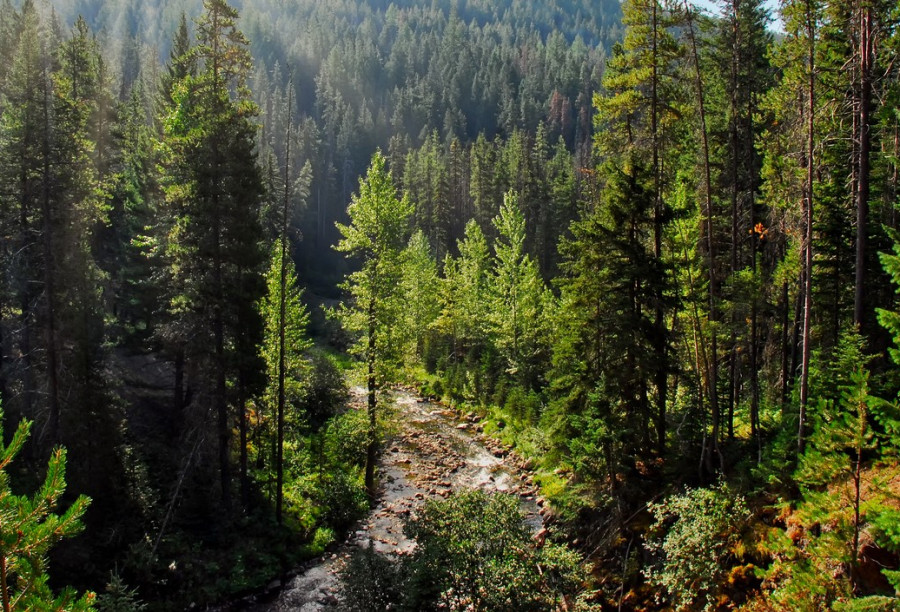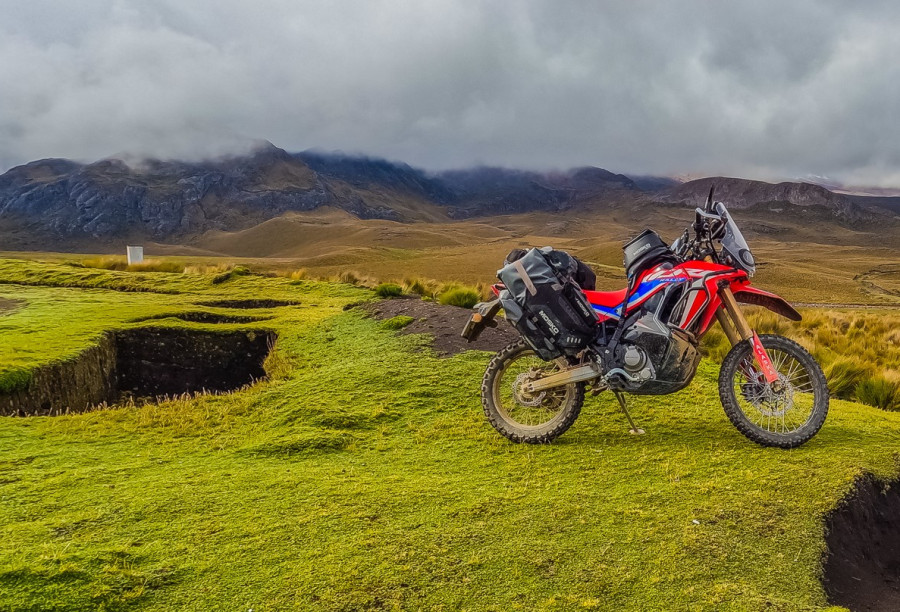
My experience as motorcycle traveler during the COVID-19 crisis
1 May 2020In January, I would not have believed anyone who told me that three months later half of the world population would be in lockdown, and the world economy would come to a complete halt with oil prices dropping beneath the zero-line. Yes, there was a virus outbreak in China but that was far away from where I was in South America.
First signs of the global outbreak
The first stories about COVID-19 entering Europe began when I was riding in Bolivia. The outbreak started in the North of Italy and reached the Netherlands when Dutch vacationers came back from their ski holidays in Italy and France. I was in contact with my family, they were not too worried. Only a few people were infected, and they could all be traced back to Italy or another infected person. At that time there were only a few people infected in the whole of South America, and people here were even less worried about the virus than in the Netherlands.
At that point, I didn't see any reason to stop my Patagonia to Alaska expedition and go back to The Netherlands. Why would I anyway? I didn't have a place to live there and also no job to return to. My life and work are on the road with Dhanno, traveling, and making videos for my YouTube- channel.
When more people got infected in Europe, with the virus spreading so quickly, it felt very counter-intuitive to return to Europe. In South America, the situation was still very much under control. I was safer from the COVID-19 in Bolivia than in the Netherlands.
Motorcycle import issues
Another reason not to return to Europe so quickly was Dhanno. Traveling through South America on your own motorcycle means that you have to get a temporary import permit (TIP) for each country you travel in. Officially, you are not even allowed to leave the country without your motorcycle! But since customs and immigration usually don't communicate very well with each other, you can leave without your bike as long as you don't mention that you have a TIP for your motorcycle.
These temporary import permits (TIP) are usually valid for 30 or 60 days after you have entered the country. Overstaying this time period is, just as when you overstay a visa, a serious issue. You either have to pay a huge fine or, worst-case scenario, customs will confiscate your motorcycle! Leaving Dhanno behind would mean my TIP would expire. Being in Bolivia, a landlocked country, it also would mean I had to transport Dhanno via air freight back to Europe; a very costly affair.
When the news came that Bolivia and Peru were going to close their international borders, I quickly crossed the border into Peru. That way I received a brand new 60-day TIP for Dhanno and not risk expiring the one for Bolivia. I would also have two months to travel through Peru, and by then, I thought, the corona crisis would probably be over and borders would have opened again so I could enter Ecuador or Colombia next.
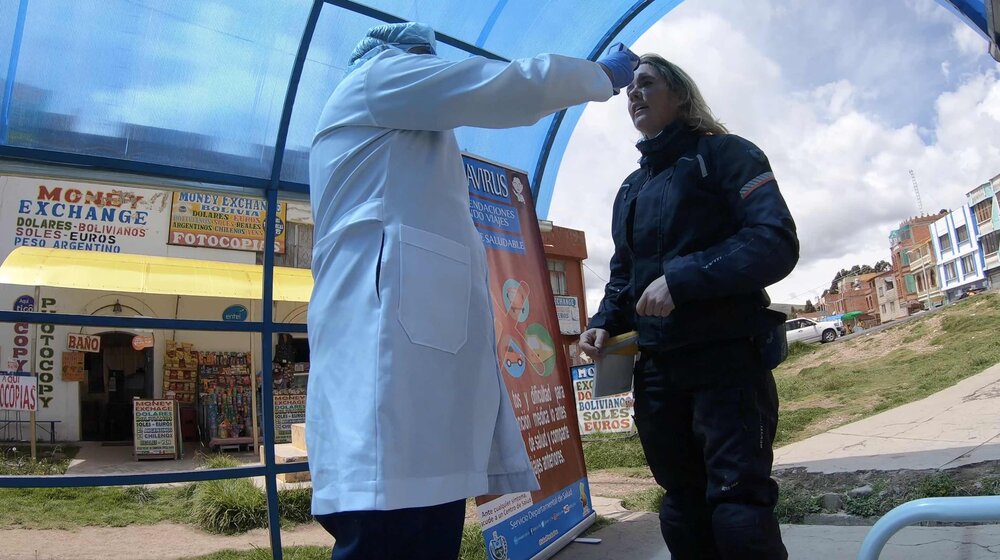
Peru went into lockdown
When Peru announced a 15-day lockdown, I still wasn't too concerned. The outbreak in Peru was very small compared to the one in The Netherlands, and their lock-down measures were much more extreme. To me, it seemed that the lockdown was mostly preventative, and with its early responsiveness, it was likely that the outbreak would be contained quickly.
Staying in one place for 15 days was going to be boring, but worthwhile if it meant that I could continue my travels after that. I would still have plenty of time to travel through Peru after this lockdown. So, I found myself a guesthouse in the small town of Lampa. The owner, Juan, seemed very friendly and quite happy with my 15 days of staying at his place as he didn't have any other guests at that time. I settled into a small and cozy room with an attached bathroom upstairs. Through the window, I could look out over the streets of Lampa and observe life in Lampa under lockdown.
During the first couple of days, I felt quite happy and relaxed. I caught up on my writing, did some video editing for my channel, and rested from my travels. I could easily walk out of town without encountering any locals, so I spent hours walking around in nature by myself. I loved it.
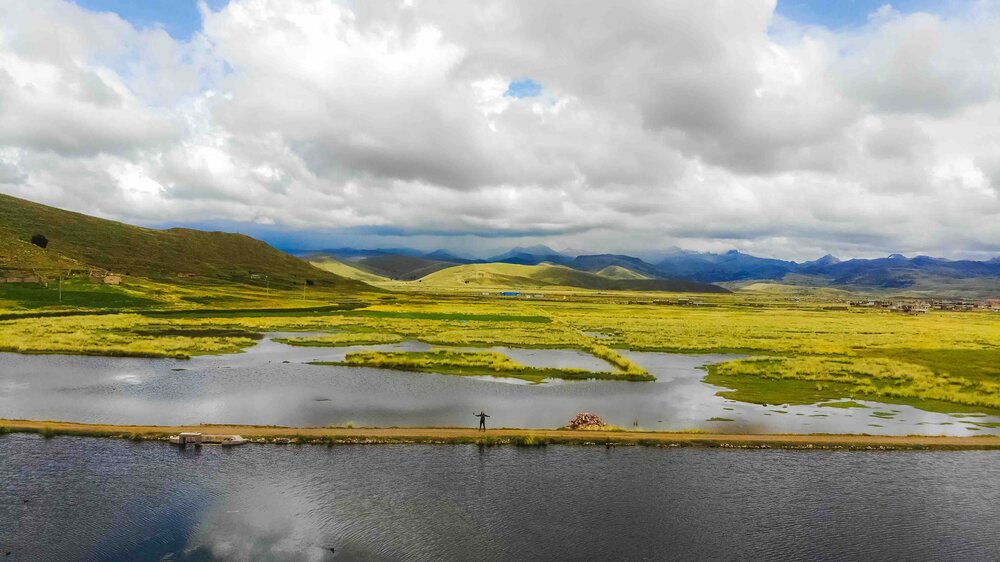
When things turned pear-shaped
Then came the day that the local police spotted me walking through the quiet streets of Lampa. It set off a chain of events that I could never have foreseen. In the days after, I was visited by the police, the tourist police, hospital personnel (twice), the Ministry of Health, the mayor of Lampa, and even the governor of the province came by.
The local media also learned about my presence in Lampa. When the news was spread on social media that there was a foreigner in town, it fired up discussions on how this was possible and why the province hadn't closed its borders sooner. The hotel owner Juan and his wife, who were still going into town to buy their groceries, had to defend themselves often for having me in their guesthouse. The local police department and the hospital also received several calls from worried locals about ‘the foreigner in town'.
The reason that people were so worried, had to do with my European looks. With the epicenter of the COVID-19 outbreak being in Europe at that time, people were afraid I carried COVID-19. The fact that I'd been in South America for 5 months and hadn't been in Europe or in contact with people from Europe didn't matter and couldn't be explained. The locals were obviously also frustrated about the forced lockdown, which meant they didn't have any income as everything had been closed down except for supermarkets and pharmacies. Many people in Peru live on a day-to-day base, what they eat depends on what they have earned that day. As a consequence of that, a wave of xenophobia swept through this small town and it was directed towards me. A situation I had never been in before.
Juan the Legend
Luckily, there weren't any confirmed Covid-19 cases in the entire province at that time. But at the same time, I was convinced that if anyone in Lampa would get infected, I would be held responsible. The only human contact I had in this period was with Juan and his wife, although I hardly ever saw them. Every day, they prepared a delicious breakfast, lunch, and dinner for me. Juan would call me to say that the food was ready, and I would come downstairs to eat by myself. When I had finished my meal, I would shout a “thank you” through the hallway and that was all the contact we had. During that time, Juan kept on defending my case to all the authorities that came by and to the villagers that spoke negatively about me. I was amazed at his calmness and that he kept on supporting this ‘scary foreigner' that I had become.
But also for him, it was getting harder and more difficult to have me in his guesthouse. Each day he distanced himself more and more from me. On day 14 of my stay at their place, we realized that none of us had gotten sick. That was quite a milestone and reassurance for all of us! We celebrated this with a barbecue and ate together. I felt so happy.
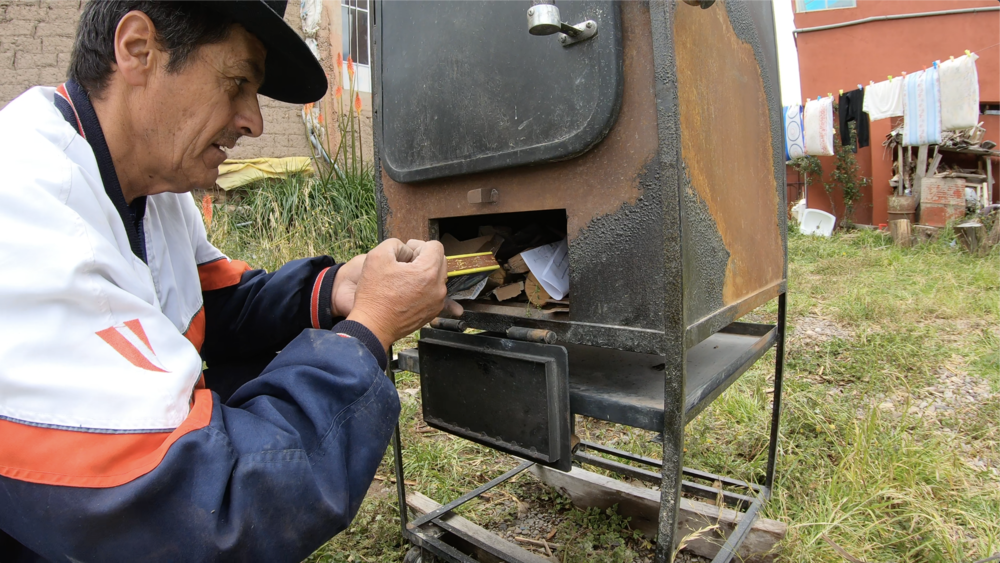
By this time, I hadn't left the guesthouse for 10 days. I was too scared to walk through the streets when there was so much fear, anger, and suspicion towards me as the only foreigner in town. It made me feel like an outcast and seeing people scurry away when they saw me, made me feel horrible. By that time, I realized how privileged my life has been, while others have to deal with this kind of behavior and fear every day.
Repatriation to The Netherlands
When the Peruvian government announced that they were going to extend the lockdown with another 14 days, I already had contact with the Dutch Embassy on a daily basis. I had realized that ‘sitting it out' in Peru was no longer a realistic option.
During those first 14 days, another thought came into my mind. What if something happened to my family in The Netherlands? With the COVID-19 spreading so fast, it had become a realistic option that one of my family members could get sick. I would then not be able to hop on an airplane and fly to them, as all flights had already been canceled to and from Peru.
All things together, I decided that I had to grab the opportunity to fly back to the Netherlands on one of the last repatriate flights from Peru. The embassy organized the travel permit for me so I could travel the 1200 km to Lima in order to catch the last flight from Lima. Juan helped me to find a trustworthy driver with a pick-up truck and together we drove to Lima.
You can read more about that journey in my blog On the ODO 20.000km or watch episodes 73 and 74 on my YouTube channel.
In Lima, I was able to leave Dhanno behind in a secured garage of a shipping company. With the seaports and airports being closed, it is not possible to ship Dhanno from Peru to the Netherlands.
Soon after my departure, the Peruvian government announced that the international air space would be closed for another 90 days. This means that I won't be able to return to Peru for at least the next three months, and Dhanno can't be transported from Peru to the Netherlands either. Her current Peruvian TIP will expire in my absence. So, I quickly filed a request for a suspension of my TIP. The Peruvian customs haven't responded yet, but as I am not the only foreigner that had to leave her vehicle behind in Peru, I hope the customs of Peru will show some leniency and provide suspensions or extensions. Time will tell.
Unexpected return in The Netherlands
After a 12 hour flight from Lima to Amsterdam, I arrived at an almost completely deserted airport. I had never seen Schiphol so empty! My bag came on the luggage carousel as one of the first items, which made me one of the first people to walk into the arrival hall. There, a large crowd of people was waiting for friends and family members returning from Peru.
When I came out, they all looked at me like I was some sort of alien. At that time, I was still wearing a bandana plus a mouth mask, as it is mandatory in Peru to do so. In The Netherlands though, nobody wears mouth masks. There is a shortage of protective equipment and the government has urged that all protective materials should go to hospitals and people working in caring. After being in Peru for so long, where mouth masks were mandatory and most people also wore gloves, it felt very strange not to wear one. It took a while before I felt comfortable walking around without one.
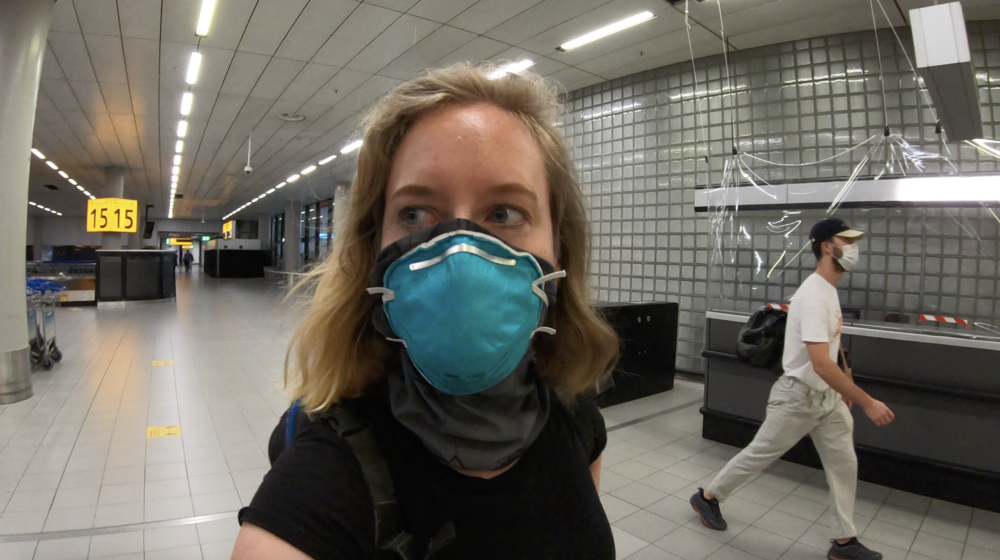
In the Netherlands, they call it an ‘intelligent lockdown'. People who have a cold are asked to stay home, everybody has to keep a distance of 1,5 meters when being outside the house, and is not to visit the elderly. Businesses have been asked to let people work from home as much as possible. Also, all schools have been closed and all events have been canceled till after summer.
To me, the Netherlands still feels like the ‘Land of the Free' compared to the situation in Peru. Although I couldn't hug my family and friends, and I stayed inside as much as possible, I can go outside whenever I want to. I can go out for a walk or take my new motorcycle for a ride!
My first days in The Netherlands felt unreal. I was very glad to be back, but what was I going to do now? Luckily, this feeling didn't last very long and I quickly saw new possibilities for typical Itchy Boots projects.
All in all, I consider myself extremely lucky to be where I am now., knowing that so many people around the world are struggling a thousandfold more than me.
The world after COVID-19
It seems that The Netherlands is getting COVID-19 under control. Every day, fewer people are brought to the hospital or die from the virus. From May 11, primary children will go back to school, but parents are still advised to work from home and all the bars and restaurants are closed.
In Peru, the situation is completely different. The number of people getting infected is still increasing fast despite the extended lockdown that is in place.
I do wonder if traveling the world by motorcycle will ever be the same again. Will I be shaking hands with people from all over the world, hug them, and thank them for their hospitality? Will xenophobia towards Chinese and Europeans linger around for much longer, and will that influence my travels through South America?
When I edited my video of the most memorable events and moments of my 60.000 kilometers ride around the world, I was reminded again what enlightened me the most about traveling, and that is meeting local people. To see and learn how they live their lives so different from me. It may take some time, but I am convinced that I will be welcomed, hugged and my hands will be shaken again someday. I cannot wait for that moment to come.
Noraly , I felt sorry for your Covid experiences un Perú . It esa hard , unexpected with an uncertain figure . Ironically today :https://twitter.com/noticiAmerica/status/1572978165097578500?t=rnUmKbYDUsH76iIX-0EMtw&s=19 . Still enjoying tour Spectacular videos un Canadá. Good routers !! .

Noraly, are you familiar with the MasterMilo (Dutch) YouTube Channel? I'm pretty sure if you took Milo your rusty Himalayan & asked him to bring it back to life & e.g. turn it into a flat-track bike or a trackday bike or whatever for you, they would be happy to do it & film the process. Also, flat track racer @leahtokelove is something big in Enfield UK & might be able to help you out with a conversion & some flat track refresher training stuff after your lockdown taster of flat-track :-).



